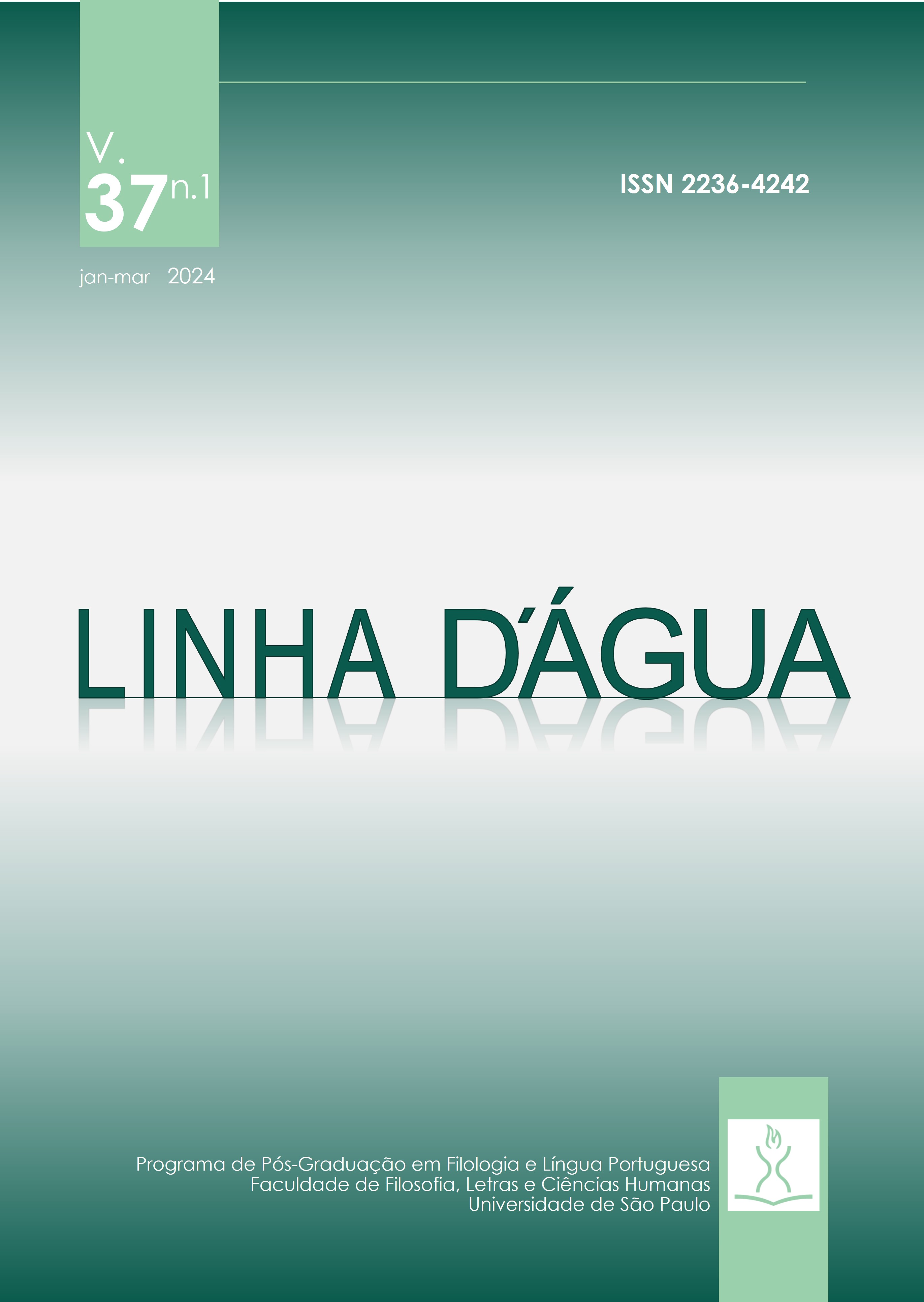The conceptual metaphors in German and Brazilian parliamentary speeches
DOI:
https://doi.org/10.11606/issn.2236-4242.v37i1p5-24Keywords:
Cognitive linguistics, Critical Discourse Analysis, Corpus-based analysis, Migration, PoliticsAbstract
This article presents partial results of an ongoing doctoral research, in which metaphors on the topic of "immigration" occurring in parliamentary speeches from Germany and Brazil in 2018 are identified and analyzed. Our aim is to find out which metaphors occur in these speeches and which factors, if any, make them more or less influential in political polarization. To do so, this research is based on Conceptual Metaphor Theory and Critical Discourse Analysis. The lexical items “migrante”, “imigrante”, “refugiado”, “Migrant” and “Flüchtling” were searched in the transcripts of the meetings of the German Parliament and the Brazilian House of Representatives with the aid of the AntConc’s concordance tool to identify metaphorical patterns. Then, we analyzed the metaphors based on Critical Discourse Analysis. The results reveal that conceptual metaphors contribute to create the division between in- and outgroup, which is characteristic of polarization.
Downloads
References
ANTHONY, L. AntConc. Disponível em: https://www.laurenceanthony.net/software/antconc/. Acesso em: 17 maio. 2021.
ARISTÓTELES. Poética - Organon - Política - Constituição de Atenas. São Paulo: Nova Cultural, 2004.
BAKER, P. et al. A useful methodological synergy? Combining critical discourse analysis and corpus linguistics to examine discourses of refugees and asylum seekers in the UK press. Discourse and Society, v. 19, n. 3, p. 273–306, 2008.
CHARTERIS-BLACK, J. Corpus Approaches to Critical Metaphor Analysis. New York: Palgrave Macmillan, 2004.
CORRÊA, L.; MELO, L. Flüchtlingswelle e ondas de refugiados: metáforas sobre refúgio e imigração na mídia online brasileira e alemã. Contingentia, v. 8, n. 2, p. 33–47, 2020.
CROFT, W.; CRUSE, D. A. Cognitive Linguistics. Cambridge: Cambridge University Press, 2004.
DEIGNAN, A. Corpus Linguistics and Metaphor. In: GIBBS JR, R. W. (Ed.). The Cambridge Handbook of Metaphor and Thought. Cambridge, New York: Cambridge University Press, 2008.
van DIJK, T. A. Discurso e Poder. São Paulo: Contexto, 2018.
EVANS, V.; GREEN, M. Cognitive Linguistics. An Introduction. Edinburgh: Edinburgh University Press, 2006.
FAIRCLOUGH, N. Discurso e Mudança Social. Brasília: Editora Universidade de Brasília, 2001.
HART, C. Discourse, Grammar and Ideology. Functional and Cognitive Perspectives. London: Bloomsbury, 2014.
LAKOFF, G. Moral Politics. How liberals and conservatives think. Chicago, London: The University of Chicago Press, 2016.
LAKOFF, G.; JOHNSON, M. Metaphors we live by. Chicago, London: The University of Chicago Press, 1980.
LAKOFF, G.; JOHNSON, M. Metáforas da Vida Cotidiana. Campinas, São Paulo: Mercado das Letras, Educ, 2002.
LAKOFF, G.; WEHLING, E. The Little Blue Book: the essencial guide to thinking and talking democratic. New York: Free Press, 2012.
LANGACKER, R. W. Foundation of Cognitive Grammar. Volume I. Stanford: Stanford University Press, 1987.
NEUGEBAUER, G. Eine kurze Befassung mit Begriffen und Thesen. In: SCHÖNFELDER, S. (Ed.). Gibt es Extremismus? Extremismusansatz und Extremismusbegriff in der Auseinandersetzung mit Neonazismus und (anti-)demokratischen Einstellungen. Dresden: Kulturbüro Sachsen, 2010.
PETERSSEN, S.; SOARES DA SILVA, A. Polarising metaphors in the Venezuelan Presidential Crisis. Journal of Language and Politics, Online First Articles. 30 nov. 2023. Disponível em: https://www.jbe-platform.com/content/journals/10.1075/jlp.22169.pet. Acesso em 06 fev. 2024.
ROOSE, J. Politische Polarisierung in Deutschland. Repräsentative Studie zu Zusammenhalt in der Gesellschaft. Berlin: Konrad-Adenauer-Stiftung e. V., 2021.
SARDINHA, T. B. Metáfora. São Paulo: Parábola Editorial, 2007.
STEFANOWITSCH, A. Corpus-based approaches to metaphor and metonymy. Em: STEFANOWITSCH, A.; GRIES, S. (Eds.). Corpus-based approaches to metaphor and metonymy. Berlin: Walter de Gruyter Verlag, 2006. p. 1–16.
VEREZA, S. “Metáfora é que nem...”: cognição e discurso na metáfora situada. Signo, v. 38, n. 65, p. 2–21, 4 jul. 2013.
WODAK, R. Do que trata a ACD – um resumo de sua história, conceitos importantes e seus desenvolvimentos. Linguagem em (Dis)curso - LemD, v. 4, n. n. esp., p. 223–243, 2004.
Downloads
Published
Issue
Section
License
Copyright (c) 2024 Marina Sundfeld Pereira

This work is licensed under a Creative Commons Attribution-NonCommercial 4.0 International License.
The Editorial Board authorizes free access to and distribution of published contentes, provided that the source is cited, that is, granding credit to the authors and Linha D'Água and preserving the full text. The author is allowed to place the final version (postprint / editor’s PDF) in an institutional/thematic repositor or personal page (site, blog), immediately after publication, provided that it is available for open access and comes without any embargo period. Full reference should be made to the first publication in Linha D'Água. Access to the paper should at least be aligned with the access the journal offers.
As a legal entity, the University of São Paulo at Ribeirão Preto School of Philosophy, Sciences and Languages owns and holds the copyright deriving from the publication. To use the papers, Paidéia adopts the Creative Commons Licence, CC BY-NC non-commercial attribution. This licence permits access, download, print, share, reuse and distribution of papers, provided that this is for non-commercial use and that the source is cited, giving due authorship credit to Linha D'Água. In these cases, neither authors nor editors need any permission.
Partial reproduction of other publications
Citations of more than 500 words, reproductions of one or more figures, tables or other illustrions should be accompanied by written permission from the copyright owner of the original work with a view to reproduction in Linha D'Água. This permission has to be addressed to the author of the submitted manuscript. Secondarily obtained rights will not be transferred under any circumstance.
How to Cite
Funding data
-
Coordenação de Aperfeiçoamento de Pessoal de Nível Superior
Grant numbers 88882.461730/2019-01










